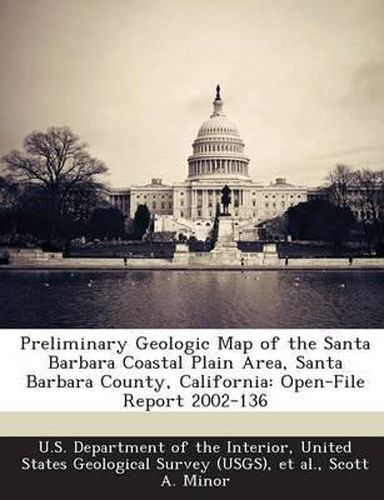Readings Newsletter
Become a Readings Member to make your shopping experience even easier.
Sign in or sign up for free!
You’re not far away from qualifying for FREE standard shipping within Australia
You’ve qualified for FREE standard shipping within Australia
The cart is loading…






This report presents a new geologic digital map of the Santa Barbara coastal plain area at a compilation scale of 1:24,000 (one inch on the map = 2,000 feet on the ground) and with a horizontal positional accuracy of at least 20 m. This preliminary map depicts the distribution of bedrock units and surficial deposits and associated deformation underlying and adjacent to the coastal plain within the contiguous Santa Barbara and Goleta 7.5’ quadrangles. A planned second version will extend the mapping westward into the adjoining Dos Pueblos Canyon quadrangle and eastward into the Carpinteria quadrangle. The mapping presented here results from the collaborative efforts of geologists with the U.S. Geological Survey Southern California Areal Mapping Project (SCAMP) (Minor, Kellogg, Stanley, Stone, and Powell) and the tectonic geomorphology research group at the University of California at Santa Barbara (Gurrola and Selting). C.L. Powell, II, performed all new fossil identifications and interpretations reported herein. T.R. Brandt designed and edited the GIS database, performed GIS database integration and created the digital cartography for the map layout. The Santa Barbara coastal plain is located in the western Transverse Ranges physiographic province along a west-trending segment of the southern California coastline about 100 km (62 mi) northwest of Los Angeles. The coastal plain region, which extends from the Santa Ynez Mountains on the north to the Santa Barbara Channel on the south, is underlain by numerous active and potentially active folds and partly buried thrust faults of the Santa Barbara fold and fault belt. Strong earthquakes that occurred in the region in 1925 (6.8 magnitude) and 1978 (5.1 magnitude) are evidence that such structures pose a significant earthquake hazard to the approximately 200,000 people living within the major coastal population centers of Santa Barbara and Goleta. Also, young landslide deposits along the steep lower flank of the Santa Y
$9.00 standard shipping within Australia
FREE standard shipping within Australia for orders over $100.00
Express & International shipping calculated at checkout
This report presents a new geologic digital map of the Santa Barbara coastal plain area at a compilation scale of 1:24,000 (one inch on the map = 2,000 feet on the ground) and with a horizontal positional accuracy of at least 20 m. This preliminary map depicts the distribution of bedrock units and surficial deposits and associated deformation underlying and adjacent to the coastal plain within the contiguous Santa Barbara and Goleta 7.5’ quadrangles. A planned second version will extend the mapping westward into the adjoining Dos Pueblos Canyon quadrangle and eastward into the Carpinteria quadrangle. The mapping presented here results from the collaborative efforts of geologists with the U.S. Geological Survey Southern California Areal Mapping Project (SCAMP) (Minor, Kellogg, Stanley, Stone, and Powell) and the tectonic geomorphology research group at the University of California at Santa Barbara (Gurrola and Selting). C.L. Powell, II, performed all new fossil identifications and interpretations reported herein. T.R. Brandt designed and edited the GIS database, performed GIS database integration and created the digital cartography for the map layout. The Santa Barbara coastal plain is located in the western Transverse Ranges physiographic province along a west-trending segment of the southern California coastline about 100 km (62 mi) northwest of Los Angeles. The coastal plain region, which extends from the Santa Ynez Mountains on the north to the Santa Barbara Channel on the south, is underlain by numerous active and potentially active folds and partly buried thrust faults of the Santa Barbara fold and fault belt. Strong earthquakes that occurred in the region in 1925 (6.8 magnitude) and 1978 (5.1 magnitude) are evidence that such structures pose a significant earthquake hazard to the approximately 200,000 people living within the major coastal population centers of Santa Barbara and Goleta. Also, young landslide deposits along the steep lower flank of the Santa Y